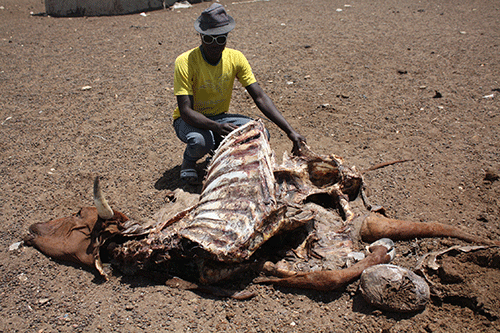Government is currently acting on its commitment to provide drought relief to the most afflicted communities in the nation.
Making her contribution in Parliament on the recently tabled Appropriation Bill for 2023/24 financial year, Popular Democratic Movement (PDM) parliamentarian Elma Dienda said there is glaring inequality in the distribution of drought relief funds.
Dienda expressed worry that there is no fair distribution of resources as people living with disabilities and senior citizens only receive N$1 400 and are not automatically eligible for drought relief.
Finance and Public Enterprises minister Iipumbu Shiimi in his mid-term budget statement noted that government made available N$643 million to supplement the drought relief provisions under the Office of the Prime Minister (OPM). This amount is intended to cover both food distribution as well as support to affected farmers.
“Going forward, the OPM has started piloting an alternative drought relief delivery mechanism through utilising vouchers so as to minimise the associated administrative costs, consequently creating an opportunity to make more food available to vulnerable people,” said Shiimi at the time.
Dienda on the other hand said the drought relief distribution raises serious questions about social justice and the need for a more inclusive aid distribution approach.
“Can the government not automatically include these vulnerable groups in drought relief aid? This re-evaluation is crucial for a balanced and fair resource distribution, reflecting a compassionate and just approach to social welfare,” the PDM lawmaker argued.
Bailouts not a remedy
Shiimi noted an additional N$602.8 million was allocated for other statutory obligations through calls on government guaranteed loans in favour of the Meat Corporation of Namibia (Meatco) and the Seaflower Whitefish Corporation.
The minister reiterated his annoyance with public enterprises, stressing that continuously bailing out these State-owned enterprises eliminates valuable resources needed for critical social investments, such as education, healthcare, housing, agriculture and social protection.
Emphasising the situation at some public enterprises warrants urgent and bold actions to ensure the sustainability, Shiimi said: “The fiscal risks from the operations of public enterprises have increased significantly through both requests for budgetary allocations as well as settlement of government guaranteed loans”.
Also taking issue with public enterprises was another PDM lawmaker, Diederik Vries, who said bailing out public enterprises may encourage them to become reckless and take on too much risk knowing that they will be saved if they fail. Therefore, he said it is important to encourage public enterprises to realign themselves to prevent continuous government bailouts.
“It is high time that we collectively hold public enterprises accountable in ensuring that they deliver on their mandates while at the same time ensuring they are profitable and self-sustainable,” said Vries.
He further recommended that government implements management performance and control systems to prevent irregular conduct and mismanagement to foster a culture of decision-making and financial accountability at public enterprises.
“Also ensure the appointment of capable, qualified, experienced and honest board members at public enterprises to guarantee effective governance. Develop and strengthen strategies at public enterprises to ensure that commercial public enterprises make profits to sustain themselves,” Vries proposed.


